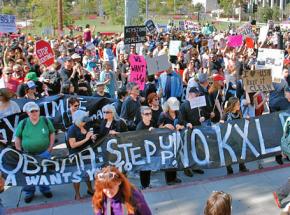LA marches for climate action
reports on a rally and march in Los Angeles that brought together many different aspects of the ecological movement.
DESPITE THE threat of heavy rain and against the backdrop of billowing smoke emitted into the atmosphere from the nearby Ports of Los Angeles and Long Beach, more than 400 people marched through the streets of the Wilmington neighborhood against hydraulic fracturing, tar sands and the Trans-Pacific Partnership.
The SoCal Climate Action Coalition 350, which includes dozens of community groups and organizations throughout California, called the March 1 rally and march, dubbed the "Great March for Climate Action."
The vast majority of marchers headed to a local park after the 2.5-mile march for a Climate Action Fair, while others continued on to downtown LA, where some are gearing up for a months-long, coast-to-coast march to Washington, D.C.
The marchers heading to D.C. are scheduled to arrive in time for congressional elections, where they will advocate on behalf of "immediate legislative and executive action to solve the climate crisis," according to the group's Facebook page.
Eighty-three organizations signed a climate action letter, which included groups as diverse as Tar Sands Action Southern California, Idle No More Los Angeles, Occupy San Pedro, Food & Water Watch, National Nurses United, Progressive Christians United, Greenpeace, International Socialist Organization-Los Angeles and Hunger Action LA.

The reason for the day's action and subsequent follow-up actions were explained in a statement:
We will march to demand a ban on fracking, elimination of tar sands, a rejection of the Trans-Pacific Partnership, all with an emphasis on environmental justice and equal protection for communities of color, the working class, and the indigenous.
DURING A rally held at Wilmington Waterfront Park, attendees were handed surgical masks, which were to be worn during the march in a symbolic gesture to emphasize the urgency to act against climate change.
Speakers represented the different currents in the movement, with some emphasizing individual lifestyle choices as a way to combat the ecological crisis, and others expanding the scope of what it will take to resist and build an effective movement to challenge the impending crisis.
Actor Ed Begley Jr., well known to LA liberal environmentalist groups, asked, "What is that list of things you can do?" a reference to recycling, driving fuel-efficient vehicles and consuming less. He later said that people shouldn't focus on "the things we cannot do."
Alicia Rivera, an activist with the environmental justice organization Communities for a Better Environment, which organizes in Wilmington--a heavily Latino populated neighborhood that shares space with the area's refineries and has suffered ill health effects for it--had more radical proposals, saying among other things that building new fire gas plants was a "fake solution."
Rivera also talked about Valero Energy Corp.'s plans to transport tar sands diluted bitumen via train daily to her neighborhood, and the need for the community to "band together with the workers" at the refineries for a just transition to more eco-friendly employment.
Kwazi Nkrumah, co-coordinator for the Martin Luther King Coalition of Greater LA, tied together issues such as poverty, unemployment, and the high cancer and asthma rates communities of color like Wilmington experience due to environmental racism--all of which are issues the "traditional" environmental movement has tended to neglect.
Nkrumah also mentioned the recent successful effort to pressure the LA City Council to place a moratorium on fracking, making it the first oil-producing city in California to ban the practice, which entails shooting water mixed with industrial chemicals into the ground under high pressure to fracture shale formations underground, so that oil and natural gas can then be extracted.
The potential negative environmental impacts that fracking could pose to California are numerous, especially when one considers that the state sits atop numerous earthquake fault lines, and is in the midst of a drought.
LA City Council member Paul Koretz said as much during a February 28 press conference held before the vote to ban fracking, according to the Los Angeles Times. "Until these radical methods of oil and gas extraction are at the very least covered by the Safe Drinking Water Act, until chemicals are disclosed and problems are honestly reported, until we're safe from earthquakes, until our atmosphere is safe from methane leaks, we need a fracking moratorium," he said before a cheering crowd of activists.
The severity of the state's drought should be the clincher in determining that the state needs a ban on fracking. However, private profit takes priority under the current social and economic system, even at the risk of contaminating dwindling water reserves for millions of people through fracking.
The recent arrest of 350 activists in D.C., who engaged in civil disobedience in an effort to thwart President Barack Obama's possible decision to approve the Keystone XL pipeline--coupled with efforts like the LA march and rally--and supporting the fights for environmental justice of indigenous and communities of color--are all examples of the kind of resistance the environmental movement must pursue.
Only then will we collectively be able to create the social power needed to rearrange the current "priorities" and put people's health and the Earth's ecological well-being before profit.


